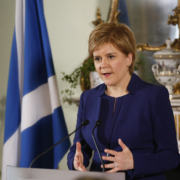Is it over for the SNP? – The New Statesman
/in Humza Yousaf, Nicola Sturgeon, Peter Murrell, Peter Murrell arrested, Politics Matters, SNP, SNP Finances, Sturgeon resigns, The New Statesman /by sm_adminScottish nationalists must face the scale of their defeat – The New Statesman
/in Nicola Sturgeon, Politics Matters, Scottish devolution, Scottish Government, Scottish Independence, SNP, The New Statesman /by sm_adminHow the SNP lost the support of the “indy-curious” like me – The New Statesman
/in Indyref 2, NHS Scotland, Nicola Sturgeon, Politics Matters, Scottish devolution, Scottish Government, Scottish Greens, Scottish Independence, SNP, Some Good News, The New Statesman /by sm_adminNicola Sturgeon makes a better case for Scottish devolution than independence – The New Statesman
/in Nicola Sturgeon, Politics Matters, Scottish devolution, Scottish Government, Scottish Independence, SNP, The New Statesman, The New Statesman /by sm_adminWhy is Nicola Sturgeon gambling on a Scottish independence referendum no one wants? – The New Statesman
/in Nicola Sturgeon, Politics Matters, Scottish devolution, Scottish Government, Scottish Greens, Scottish Independence, SNP, The New Statesman, United Kingdom /by sm_adminThe SNP has missed its chance for Scottish independence – The New Statesman
/in Nicola Sturgeon, Politics Matters, Scottish Independence, SNP, Some Good News, The New Statesman /by sm_adminThe tragic failures of Scottish devolution – The New Statesman
/in Politics Matters, Scottish devolution, Scottish Government, Scottish Independence, Scottish Labour, SNP, The New Statesman /by sm_adminWhy the SNP must stop hoarding power in Edinburgh – The New Statesman
/in Edinburgh Matters, Glasgow Matters, North East Matters, Scotland Under the SNP, Scottish devolution, Scottish Government, SNP, The New Statesman, The West Coast Matters /by sm_adminPlease click on the image below to read more:
As Glasgow prepares to host global leaders at COP26, the eyes of the world are turning towards the city for the first time since the 2014 Commonwealth Games.
The pressure is on, and Susan Aitken, the SNP council leader since 2017, is bearing the brunt of complaints about what critics say are dirty streets, the many gap sites and the authority’s troubled relationship with trade unions. In a recent, excruciating television interview, she was repeatedly challenged to admit the streets were “filthy”, finally admitting the place could do with a “spruce up”.
For the past year, as November’s COP26 summit has drawn nearer, Aitken has occupied an elevated status among her fellow regional and urban leaders. She has addressed the World Bank, formed close relationships with the mayors and administrations of many of the world’s great cities, and worked closely with England’s directly-elected mayors such as Andy Burnham and Sadiq Khan. She has also held discussions with private investors, and would like the UK government to stand behind the multi-billion-pound borrowing Glasgow and others need to renew their municipal fabric and create green infrastructure. She sees COP26 as an unmissable opportunity to accelerate the city’s economic resurgence and improve its global profile.
Aitken admits Glasgow isn’t what it could be. Covid, economic challenges, and strained relationships with the unions have all had an impact. And in important ways her hands are tied, not by international institutions or the UK government, but by Nicola Sturgeon. It’s generally accepted that Scottish local government is among the most circumscribed in Europe. Devolution to Holyrood has not been accompanied by devolution from Holyrood, where instead the SNP administration has overseen centralisation of power to Edinburgh.
A council’s ability to raise funds is greatly restricted. Scottish council taxes have been frozen then capped by successive SNP governments, while non-domestic rates are set centrally, collected locally, sent back to the centre then redistributed. Local authorities face criticisms from local people for challenges and cuts they have little power to address.
For political news, click the link: https://www.scotlandmatters.co.uk/politics-matters/






